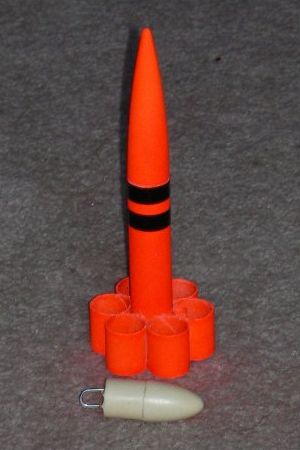Hartle Engineering Solid Resin Nose Cone
Hartle Engineering - Solid Resin Nose Cone {Component}
Contributed by Dick Stafford
| Manufacturer: | Hartle Engineering  |

Brief:
Last year, I received samples of the new Hartle Engineering solid resin nose cones from
JonRocket. I've been remiss in submitting a review. Thanks, and my apologies
John!. Hartle offers three styles of BT-5 cones and one BT-20 cone. You can see all of them on JonRocket's
nose cone page. This review will describe the cones and the rocket
I built from the longer BT-5 cone, the Mini-Toobah. The name is a homage to Dave Weber's
Toober, which has logged over
200 high power flights.
Construction:
The parts list:
- Hartle NC-5B cone
- BT-5, 6.25"
- Estes 1/8" launch lug
- Spent mini-motor case (could use a real motor block)
- Thin Kevlar®, ~ 12"
- Thin elastic, ~ 4"
The Hartle cones are solid cast and their outer surface is perfect. The cone-to-shoulder transition was clean on the longer cone but was rough on the shorter one. The later was easily cleaned up with a sharp hobby knife. The attachment point appears to be a paper clip...works as good as anything. I found them to be a loose fit in the Estes BT-5, which is easily fixed with a little tape.
The cones are, as expected, heavier than the typical hollow plastic or balsa. However, unless you're building a MicroMaxx model, the added weight shouldn't be an issue. I had kicked around building a micro but decided to go for a 13mm design instead. The shorter cone would make a great micro-Fat Boy or Big Bertha but I opted for a downscale of my El Tubo Loco.
This was a trivial build. From BT-5 stock, I cut one 2.5" body section and six 5/8" tube fins. These were glued together in pairs and then to the body tube. I used Aleene's Tacky glue throughout. A 5/8" long lug is mounted in one of the fins. I cut a motor block from a spent casing. This was notched and the Kevlar® was tied around it. There is not much room in the body minus the motor and the cone's shoulder. It was all I could do to pack the shock harness.
To make sure it is stable, I weighed the components and made a RockSim model. The cone alone is 0.24 oz and the entire rocket is 0.34 oz. It is quite stable.
Finishing:
I first scuffed the cone with fine sandpaper and shot a coat of PlastiCoat primer. I anticipated this will be hard to
find in the grass, so I went for a bright finish using Rustoleum day-glo orange. I added two vinyl strips to snazz it
up a bit.
Flight:
There wasn't much prep as it uses tumble recovery. It flew nicely on an A3-4 and I could even see it recover!
Summary:
The Hartle Engineering cones are nice to work with. In this case, their solid construction and weight helped with
stability.
I like the design of this little rocket but, being small, it could easily disappear into rocket eating grass, shrubbery, or trees.
Sponsored Ads
 |
 |











